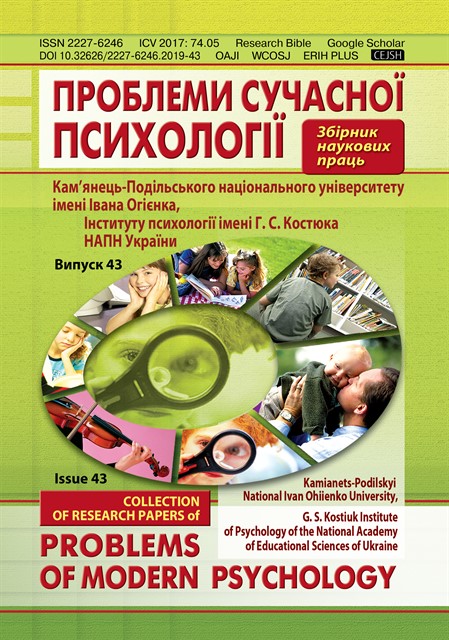Ампліфікація здібностей соціального інтелекту вчителів сучасної середньої загальноосвітньої школи
DOI:
https://doi.org/10.32626/2227-6246.2019-43.104-125Ключові слова:
соціальний інтелект, когнітивний аспект, емпатійний аспект, мнемічний аспект, метакогнітивна сфера, ампліфікація здібностей соціального інтелекту.Анотація
У статті зазначено, що соціальний інтелект розглядається як здат-
ність, що має певні особливості. Так, експлікація соціального інтелекту
є можливою лише в межах здійснення особистістю суб’єкт-суб’єктної
діяльності. Зазначено, що ампліфікація здібностей соціального інте-
лекту відбувається у процесі міжособистісної взаємодії. Ураховуючи
багатоаспектний характер сфери експлікації цих здібностей, є очевид-
ним те, що соціальний інтелект уміщує певний комплекс здатностей,
які чітко узгоджені між собою та є доволі сталими у конкретної осо-
бистості. Визначено, що становлення цієї групи здібностей зумовле-
но процесом соціалізації особистості, впливом як внутрішніх ресурсів
і характерологічних особливостей індивіда, ґендерних відмінностей
тощо, так і впливом оточуючого середовища на людину.
Автори статті вважають, що соціальний інтелект педагога
вміщує когнітивний, емпатійний і мнемічний аспекти. Елементи (або
скрипти, фрейми, концепти) емпатійного аспекту соціального інте-
лекту складають зміст конкретних усвідомлених педагогом образів
реальності, які можуть бути як такими, що сприймаються безпосе-
редньо, так і такими, що виникають у спогадах і уяві особистості. Спе-
цифічна функція емпатійного аспекту соціального інтелекту полягає
в тому, що емпатійні фрейми, скрипти, концепти наділяють емоцій-
ністю продукти інтелектуальної діяльності, своєрідну картину світу,
яка складається у суб’єкта в результаті роботи соціального інтелек-
ту, внаслідок чого світ постає для суб’єкта як існуючий у метакогні-
тивній сфері.
Отримані результати за рівнями сформованості соціального ін-
телекту вчителів ЗОШ свідчать про те, що від рівня кваліфікації вчи-
теля, тобто від стажу роботи у школі, від віку респондента тощо
рівень розвитку соціального інтелекту не залежить. Доведено, що
соціальний інтелект учителя залежить, передусім, від ґендерних осо-
бливостей респондентів, а також від предметної сфери професійної
діяльності, якою педагог займається з моменту закінчення закладу
вищої освіти. Отже, рівень розвитку соціального інтелекту вчителя
залежатиме від психологічного типу його особистості, а цей тип, у
свою чергу, зумовив обрання респондентом тієї чи іншої сфери профе-
сійної діяльності (тобто, природничо-гуманітарної чи фізико-мате-
матичної, обрання професії вчителя початкових класів тощо). Саме
психологічний тип особистості вчителя великою мірою й забезпечує
ампліфіковану структуру здібностей педагога, які входять до його со-
ціального інтелекту.
Посилання
Aminov, N. A., & Molokanov, M. V. (1992). О komponentah special’nyh sposobnostej budushchih shkol’nyh psihologov [About the components of special abilities of future school psychologists]. Psyhologicheskij zhurnal – Psychological Journal, 5, 13–28 [in Russian].
Vashchenko, I. V., & Onufriieva, L. A. (2018). Sutnisnі kharakterystyky ta strukturni komponenty emotsiinoi zrilosti pratsivnykiv komertsiinykh bankiv [Essential characteristics and structural components of the commercial banks employees’ emotional maturity]. Psychological Journal, 5 (15), 224–236. DOI https://doi.org/10.31108/1.2018.5.15.
Guilford, J., & O’Sulliven, M. Тest «Social’nyj intellekt» (v adaptacii Е. S. Мihajlovoj) [The test «Social intelligence» (in adaptation done by E. S. Mikhailova)]. Retrieved from lib.chdu.edu.ua/pdf/posibnuku/160/41.pdf [in Russian].
Jemeljanov, Ju. N. (1991). Teorija formirovanija i praktika sovershenstvovanija kommunikativnoj kompetentnosti [The theory of the development and the practice of improving communicative competence]. Extended abstract of Doctor’s thesis. Leningrad [in Russian].
Kunicyna, V. N. (1995). Social’naja kompetentnost’ i social’nyj intellekt: struktura, funkcii, vzaimootnoshenie [Social competence and social intelligence: structure, functions, relationships]. Sankt-Peterburg : SPbTU, № 2, 48–59 [in Russian].
Leontyev, A. N. (1981). Problemy razvitiya psihiki [Problems of the development of the psyche]. Moskva : Izd-vo MGU [in Russian].
Yuzhaninova, A. L. (1984). K probleme diagnostiki social’nogo intellekta lichnosti [To the problem of the diagnostics of social intelligence of the personality]. Problemy ocenivanija v psihologii – Problems of evaluation in psychology. Saratov, p. 84–87 [in Russian].
Allport, G. W. (1937). Personality: A Psychological Interpretation. New York, 516 p.
Argyle, M., Furnham A., & Graham, J. (1981). Social situations. London : Cambrige University Press. 133 р.
Cantor, N. G., & Kihlstrom, J. F. (1987). Personality and social intelligence. New York : Prentice-Hall, Inc. Englewood Cliffs, New Jersey. 420 p.
Onufriieva, L. A. (2016). Emotional intelligence in the future socionomic specialists’ professional psychological training. Science and Education a New Dimension. Pedagogy and Psychology, IV (47), Issue 101, 34–37. Budapest.
##submission.downloads##
Опубліковано
Як цитувати
Номер
Розділ
Ліцензія
Редакція має повне право публікувати у Збірнику оригінальні наукові статті як результати теоретичних і експериментальних досліджень, які не знаходяться на розгляді для опублікування в інших виданнях. Автор передає редколегії Збірника права на розповсюдження електронної версії статті, а також електронної версії англомовного перекладу статті (для статей українською та російською мовою) через будь-які електронні засоби (розміщення на офіційному web-сайті Збірника, в електронних базах даних, репозитаріях та ін).
Автор публікації зберігає за собою право без узгодження з редколегією та засновниками використовувати матеріали статті: а) частково чи повністю в освітніх цілях; б) для написання власних дисертацій; в) для підготовки абстрактів, доповідей конференцій та презентацій.
Автор публікації має право розміщувати електронні копії статті (у тому числі кінцеву електронну версію, завантажену з офіційного web-сайту Збірника) на:
- персональних web-ресурсах усіх Авторів (web-сайти, web-сторінки, блоги тощо);
- web-ресурсах установ, де працюють Автори (включно з електронними інституційними репозитаріями);
- некомерційних web-ресурсах відкритого доступу (наприклад, arXiv.org).
Але в усіх випадках обов’язковою є наявність бібліографічного посилання на статтю або гіперпосилання на її електронну копію, що містяться на офіційному сайті Збірника.






